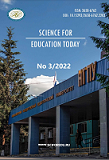Сравнение форм воспитательной работы образовательных организаций в цифровом образовательном пространстве и предпочтений обучаемых
A comparative analysis of moral education forms in the digital learning environment within educational settings and students’ preferences
Author(s): Alla Fedorovna Matuszak, Olga Yuryevna Pavlova, Yulia Ablullovna Akhkamova, Aleksandra Vladimirovna Zyryanova, Nadezhda Viktorovna Alekhina, Natalia Valeryevna Gribacheva, Vitaliy Sergeevich TsilitskySubject(s): School education, Educational Psychology, Sociology of Education, Distance learning / e-learning, Pedagogy
Published by: Новосибирский государственный педагогический университет
Keywords: Digital learning environment; Forms of Moral Education; Directions of Moral Educations; Preferences of schoolchildren; Preferences of future teachers;
Summary/Abstract: Introduction. The paper is devoted to the problem of comparing the readiness of schools, students and future teachers for moral educational activities in the digital learning environment. In order to solve the research problem, it is necessary to compare forms of moral education activities in the digital learning environment which are offered by modern schools and the expectations of students, as well as the preferences and skills of Education students – future teachers. Thus, the purpose of the research is to compare the preferences of students and the forms actually used in the content of education in the digital learning environment. Materials and Methods. The method of analysis of information from official school websites was applied. Based on its results, a written survey of pupils and future teachers was carried out in order to select / reject the choice of each form of activity for the subsequent ranking of the forms of moral educational work in the digital learning environment. The authors analyzed the websites of selected Chelyabinsk schools where teaching internship of Education students was carried out. The sample included 135 secondary and high school students (59 male and 76 female) and 34 university students (2 male and 32 female). Statistical data processing was carried out on the basis of the Mann-Whitney Utest and the Wilcoxon T-test. Results. The authors summarized the range of forms of moral educational activities implemented by schools, which included online festivals, workshops, shifts, online theaters, thematic meetings, online projects, class hours, memos, educating activities, video lessons, school media channels, online newspapers, promotions, publication of collections, competitions, online forums. It was found that a wide range of activities was offered only in one educational setting. The rest limited themselves to participation in municipal events. Meanwhile, it was emphasized that schoolchildren showed interest in the proposed activities. The authors noted that workshops, online projects, promotions, competitions and shifts aroused the greatest interest. The main research result consisted in comparing the preferences of students and future teachers regarding the identified forms of work. Based on the Mann-Whitney U-criterion (Uemp=116.5 at a significance level of p≤0.01), the authors found that pupils and students had close preferences for the forms of educational activities in the digital learning environment. However, the Wilcoxon T-test (Temp=5.5) showed that students, being prepared to conduct moral educational activities, did not aim at implementing them in the digital learning environment. Conclusions. As a result of the study, the authors came to the conclusion that the preferences of pupils and future teachers basically coincided, which could potentially give a good result of moral educational work in the digital learning environment. However, firstly, schools have not formed such a wide range of moral educational activities in the digital learning environment as they have done in traditional offline education. Secondly, future teachers consider the digital nature of the educational environment as a demotivating factor, demonstrating the desire to educate offline, by their own example. They do not tend to look for a ‘fundamentally different’ organization of education in a digital educational environment.
Journal: Science for Education Today
- Issue Year: 12/2022
- Issue No: 3
- Page Range: 7-30
- Page Count: 24
- Language: Russian

